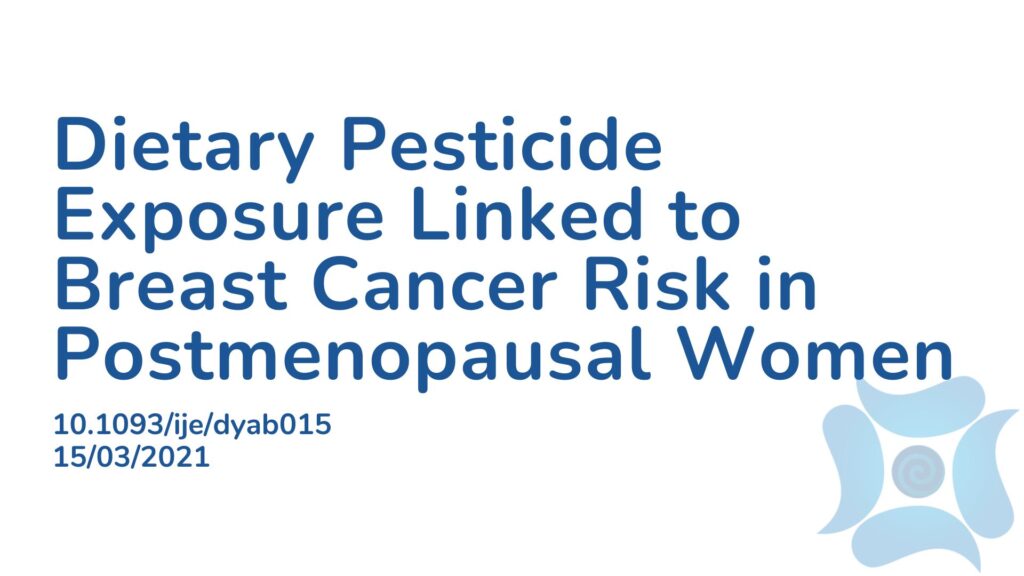Summary:
Large quantities of plant-protection products, such as pesticides, are used in French agricultural practices. Negative impacts of pesticides on human health have been documented in the literature, including endocrine disruption and oxidative stress. These mechanisms have been linked to carcinogenesis, meaning they have the potential to cause cancer. The International Agency for Research on Cancer (IARC) has classified many pesticides as ‘probably carcinogenic to humans’ and ‘possibly carcinogenic to humans’. Breast cancer (BC) is the most common and leading cause of cancer death among women in France. Studies have found associations between occupational pesticide exposure in agricultural settings and various cancers, including myeloma, non-Hodgkin lymphoma, and prostate cancer. Associations with other cancers, such as stomach, esophagus, liver, colorectal, and especially reproductive system cancers, have also been reported, potentially induced by endocrine-disruption mechanisms. Some studies have also found links between BC risk and organophosphorus pesticide (OP) exposure among farmers’ wives. However, in the general population, although food is considered the primary exposure pathway, data on associations between dietary pesticide exposure and cancer are lacking. The purpose of this paper was to study the association between dietary pesticide exposure and BC risk among postmenopausal women. Data submitted in 2014 were reviewed, wherein participants completed a self-administered food-frequency questionnaire that distinguished between conventional and organic foods. A total of 13,149 postmenopausal women were included in the analysis. An association was found between low exposure to synthetic pesticides and low postmenopausal BC risk. A positive association was found between pesticide exposure and postmenopausal BC risk specifically among overweight and obese women. These associations suggest a potential role of dietary pesticide exposure in BC risk. Further research is needed to investigate the mechanisms and confirm these results in other populations.
Abstract:
Background: Some pesticides, used in large quantities in current agricultural practices all over Europe, are suspected of adverse effects on human reproductive health (breast and prostate cancers), through mechanisms of endocrine disruption and possible carcinogenic properties, as observed in agricultural settings. However, evidence on dietary pesticide exposure and breast cancer (BC) is lacking for the general population. We aimed to assess the associations between dietary exposure to pesticides and BC risk among postmenopausal women of the NutriNet-Santé cohort.
Methods: In 2014, participants completed a self-administered semi-quantitative food-frequency questionnaire distinguishing conventional and organic foods. Exposures to 25 active substances used in EU plant-protection products were estimated using a pesticide-residue database accounting for farming practices, from Chemisches und Veterinäruntersuchungsamt Stuttgart, Germany. Non-negative matrix factorization (NMF), adapted for data with excess zeros, was used to establish exposure profiles. The four extracted NMF components’ quintiles were introduced into Cox models estimating hazard ratio (HR) and 95% confidence interval (95% CI), adjusted for known confounding factors.
Results: A total of 13 149 postmenopausal women were included in the analysis (169 BC cases, median follow-up = 4.83 years). Negative associations between Component 3, reflecting low exposure to synthetic pesticides, and postmenopausal BC risk were found [HRQ5 = 0.57; 95% CI (0.34; 0.93), p-trend = 0.006]. Positive association between Component 1 score (highly correlated to chlorpyrifos, imazalil, malathion, thiabendazole) and postmenopausal BC risk was found specifically among overweight and obese women [HRQ5 = 4.13; 95% CI (1.50; 11.44), p-trend = 0.006]. No associations were detected for the other components.
Conclusion: These associations suggest a potential role of dietary pesticide exposure on BC risk. Further research is needed to investigate the mechanisms and confirm these results in other populations.
Article Publication Date: 15/03/2021
DOI: 10.1093/ije/dyab015



